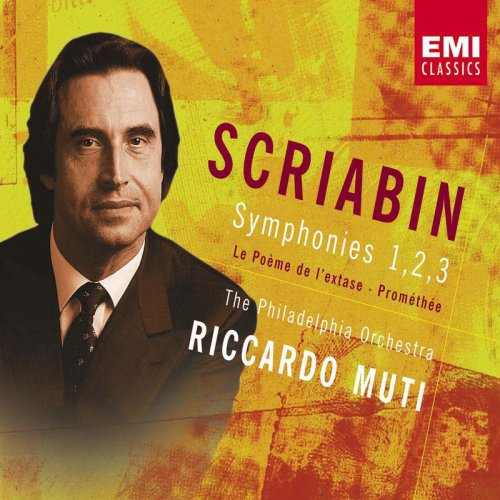
The Philadelphia Orchestra, Riccardo Muti - Scriabin: Symphonies 1, 2 & 3 (2001)
BAND/ARTIST: The Philadelphia Orchestra, Riccardo Muti
- Title: Scriabin: Symphonies 1, 2 & 3
- Year Of Release: 2001
- Label: EMI Classics
- Genre: Classical
- Quality: FLAC (tracks)
- Total Time: 03:08:06
- Total Size: 868 mb
- WebSite: Album Preview
Tracklist:
CD 1
1. Symphony No.1 in E Major, Op.26: I. Lento 07:38
2. Symphony No.1 in E Major, Op.26: II. Allegro dramatico 08:53
3. Symphony No.1 in E Major, Op.26: III. Lento 10:12
4. Symphony No.1 in E Major, Op.26: IV. Vivace 03:14
5. Symphony No.1 in E Major, Op.26: V. Allegro 07:34
6. Symphony No.1 in E Major, Op.26: VI. Andante 13:03
CD 2
1. Symphony No.2 in C Minor, Op.29: I. Andante 07:52
2. Symphony No.2 in C Minor, Op.29: II. Allegro 11:39
3. Symphony No.2 in C Minor, Op.29: III. Andante 13:46
4. Symphony No.2 in C Minor, Op.29: IV. Tempestuoso 05:59
5. Symphony No.2 in C Minor, Op.29: V. Maestoso 08:56
6. Symphony No. 4 (Poème de l'extase), Op. 54 20:02
CD 3
1. Symphony No.3 in C Minor, Op.43 'The Divine Poem': I. Introduction: Lento: Divin, grandiose - LUTTES: Allegro: Mystérieux, tragique - Sombre, haletant, précipité 25:46
2. Symphony No.3 in C Minor, Op.43 'The Divine Poem': II. VOLUPTÉS: Lento: Sublime - Vivo: Divin essai 12:29
3. Symphony No.3 in C Minor, Op.43 'The Divine Poem': III. JEU DIVIN: Allegro: avec une joie éclatante 10:16
4. Symphony No. 5 (Poème du feu), Op. 60, "Prometheus" 20:47
Performers:
The Philadelphia Orchestra
Riccardo Muti
CD 1
1. Symphony No.1 in E Major, Op.26: I. Lento 07:38
2. Symphony No.1 in E Major, Op.26: II. Allegro dramatico 08:53
3. Symphony No.1 in E Major, Op.26: III. Lento 10:12
4. Symphony No.1 in E Major, Op.26: IV. Vivace 03:14
5. Symphony No.1 in E Major, Op.26: V. Allegro 07:34
6. Symphony No.1 in E Major, Op.26: VI. Andante 13:03
CD 2
1. Symphony No.2 in C Minor, Op.29: I. Andante 07:52
2. Symphony No.2 in C Minor, Op.29: II. Allegro 11:39
3. Symphony No.2 in C Minor, Op.29: III. Andante 13:46
4. Symphony No.2 in C Minor, Op.29: IV. Tempestuoso 05:59
5. Symphony No.2 in C Minor, Op.29: V. Maestoso 08:56
6. Symphony No. 4 (Poème de l'extase), Op. 54 20:02
CD 3
1. Symphony No.3 in C Minor, Op.43 'The Divine Poem': I. Introduction: Lento: Divin, grandiose - LUTTES: Allegro: Mystérieux, tragique - Sombre, haletant, précipité 25:46
2. Symphony No.3 in C Minor, Op.43 'The Divine Poem': II. VOLUPTÉS: Lento: Sublime - Vivo: Divin essai 12:29
3. Symphony No.3 in C Minor, Op.43 'The Divine Poem': III. JEU DIVIN: Allegro: avec une joie éclatante 10:16
4. Symphony No. 5 (Poème du feu), Op. 60, "Prometheus" 20:47
Performers:
The Philadelphia Orchestra
Riccardo Muti
Had he lived into the age of recordings instead of dying in 1915, Scriabin would no doubt have relished the idea of listening to a complete cycle of his own symphonic works. Of course, had he lived into the age of recordings, Scriabin would have added only one other work to his oeuvre -- the Mysterium for soloists, choruses, and orchestras along with actors, dancers, perfumers, and light projector operators plus percussionists striking bells suspended from balloons -- because, according to the composer, at the conclusion of the work's premiere, the world as we know it would have come to an end with the transfiguration of humanity, thereby foreclosing further opportunities for listening to recordings. Thus, deprived of transcendence, we will have to content ourselves with the more circumscribed ecstasy of Scriabin's extant symphonic works. While some listeners would argue that Evgeny Svetlanov's cycle with the USSR Symphony from the '60s delivered the more authentic "Scriabin experience," most listeners would agree that Riccardo Muti's cycle with the Philadelphia Orchestra from the late '80s and early '90s delivered better-played and better-sounding performances. Of course, the Philadelphia at that point in Muti's tenure as music director was only a marginally more polished orchestra than the USSR Symphony under Svetlanov, and EMI's early digital sound was only slightly less distant than Melodiya's Russian stereo sound, so these distinctions are not necessarily decisive. More persuasively, Muti's interpretations, like the works themselves, grow grander and more glorious as the cycle progresses. Muti's First is unbelievably massive; his Second is incredibly monumental; his Third, subtitled "The Divine Poem," is unthinkably egomaniacal; his Fourth, called "The Poem of Ecstasy," is unimaginably monomaniacal; and his Fifth, called "Prometheus -- The Poem of Fire," is inconceivably megalomaniacal. Scriabin, had he lived to hear it, would have loved it.
As a ISRA.CLOUD's PREMIUM member you will have the following benefits:
- Unlimited high speed downloads
- Download directly without waiting time
- Unlimited parallel downloads
- Support for download accelerators
- No advertising
- Resume broken downloads


